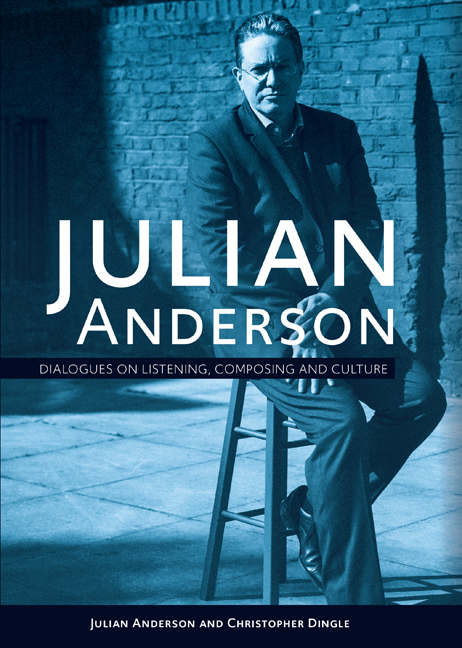Book contents
- Frontmatter
- Contents
- List of Illustrations
- Foreword
- Acknowledgements
- Introduction
- Prelude – Jeux: A Conversation Over Lunch
- Conversation One Origins
- Conversation Two Enthusiasms
- Conversation Three Training
- Conversation Four Dance
- Conversation Five Folk
- Conversation Six Composing (or Not)
- Conversation Seven Understandings
- Conversation Eight Beginnings (and Endings)
- Conversation Nine Puzzles
- Conversation Ten Singing
- Conversation Eleven Olly
- Conversation Twelve Memory
- Conversation Thirteen Opera
- Conversation Fourteen Practices
- Conversation Fifteen Outsiders?
- Conversation Sixteen Quartets
- Conversation Seventeen Advocacy
- Conversation Eighteen Partnerships
- Coda: Multiple Choices
- Chronology
- List of Personae
- Glossary of Musical Terms
- Macrotonality
- Catalogue of Published Works by Julian Anderson
- List of Recordings of Julian Anderson’s Music
- Bibliography
- Discography
- Index
Conversation Four - Dance
Published online by Cambridge University Press: 16 September 2020
- Frontmatter
- Contents
- List of Illustrations
- Foreword
- Acknowledgements
- Introduction
- Prelude – Jeux: A Conversation Over Lunch
- Conversation One Origins
- Conversation Two Enthusiasms
- Conversation Three Training
- Conversation Four Dance
- Conversation Five Folk
- Conversation Six Composing (or Not)
- Conversation Seven Understandings
- Conversation Eight Beginnings (and Endings)
- Conversation Nine Puzzles
- Conversation Ten Singing
- Conversation Eleven Olly
- Conversation Twelve Memory
- Conversation Thirteen Opera
- Conversation Fourteen Practices
- Conversation Fifteen Outsiders?
- Conversation Sixteen Quartets
- Conversation Seventeen Advocacy
- Conversation Eighteen Partnerships
- Coda: Multiple Choices
- Chronology
- List of Personae
- Glossary of Musical Terms
- Macrotonality
- Catalogue of Published Works by Julian Anderson
- List of Recordings of Julian Anderson’s Music
- Bibliography
- Discography
- Index
Summary
Dance is of fundamental importance to Anderson, and should not be overlooked as a factor in any of his pieces. After briefly noting the importance of ballet in his formative years, this conversation explores Anderson's early collaborations with choreographers, from being paired with Adam Cooper on his first day at the Royal College of Music to the first project with Mark Baldwin, Towards Poetry, which featured Darcey Bussell as soloist. The status of music in the dance world, the openness of dance audiences to new music and the potential value of dance for composers are discussed before moving on to works by Nijinsky (along with the negative attitudes of Debussy and Stravinsky), Ashton and MacMillan, as well as ballets to key modernist classics, such as Le Marteau sans maître. Anderson's work with Mark Baldwin is explored at some length, with detailed information on The Comedy of Change in particular, revealing along the way the extent of Anderson's love of birdsong.
CD: Ballet has been very important for you. At what point did you first work with dance in mind, which isn't necessarily the same as your first piece written for dancing?
JA: In fact in my case it's very much not the same thing. That comes from two things, both of them background issues. One is that my dad had a record of The Rite of Spring and also used to play things like Polovtsian Dances and Scheherazade, which, though it wasn't originally a ballet, was made into one.
CD: The wonderful Ballets Russes version.
JA: Yes. There was a lot of that Russian music, and also the great Tchaikovsky ballets and so on. This was the first music I heard, so it comes partly from that.
It comes also from the fact that my mother and stepfather were very keen ballet fans. They used to go to ballet and modern dance a lot and took me and the rest of the family along sometimes. From the age of about 10 onwards I saw lots of modern dance and ballet. I was very lucky. I became very aware, even as a kid, that I was thinking of music in terms of movement, that I needed sometimes even to move when I was composing, to dance to what I was doing, physically, although I’m not a dancer.
- Type
- Chapter
- Information
- Julian AndersonDialogues on Listening, Composing and Culture, pp. 71 - 91Publisher: Boydell & BrewerPrint publication year: 2020

